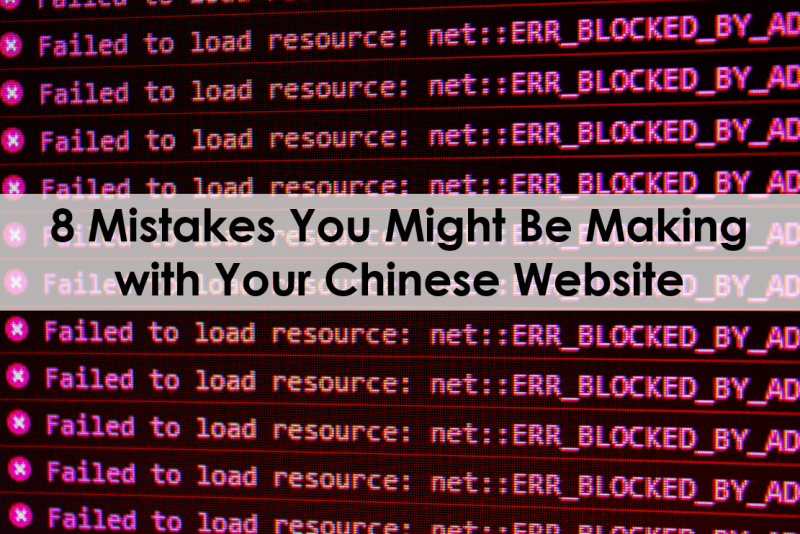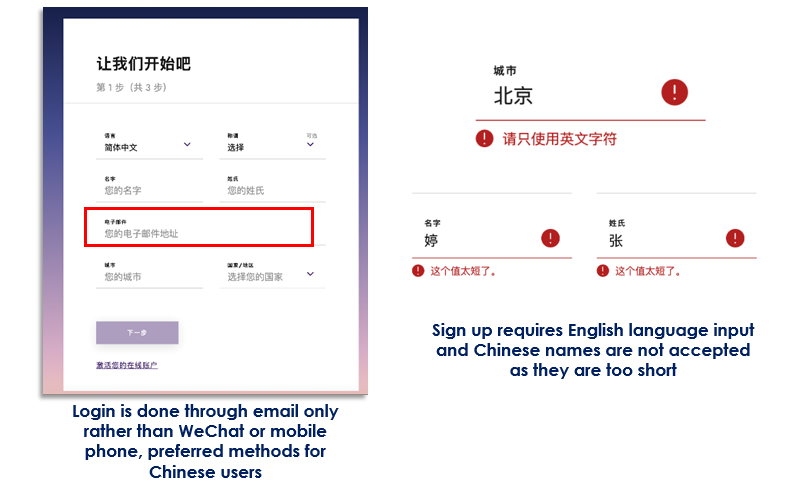
Most tourism brands and businesses that want to target the Chinese market need to have a Chinese website. But this isn’t so simple as just translating your content into Chinese, because of China’s online regulatory environment, as well as differences in consumer habits, preferences, and expectations. Here are 8 mistakes you might be making with your Chinese website.
Dragon Trail has been building our clients’ websites for the last 15 years in China, so we have extensive experience covering everything from hosting and ICP licenses, to localized booking engines and WeChat integration. Contact us to discuss how we can help build or improve your Chinese website.
1. Not having one
Do you even need a Chinese website, especially if you already have Chinese social media accounts? It’s a good question, especially given that Chinese internet users are much more likely to be accessing information through social media apps like WeChat and Xiaohongshu (aka RedNote) than using the open web. For small businesses such as restaurants, building a Chinese website probably isn’t a top priority. But it is still very important for large businesses with a strong China focus – such as hotel chains, airlines, or major tourist attractions, as well as official tourism boards, to create this resource for Chinese consumers. Having a Chinese website demonstrates your commitment to the market, communicates trustworthiness, builds brand awareness, and can be used to offer a booking channel.
2. Linking or embedding content that is blocked in China
As you probably know, China has a national firewall, and this blocks many Western websites such as Google, YouTube, Facebook, Instagram etc. Embedding or just linking to content from blocked websites can cause your website to have extremely slow loading times and/or not function properly in China – this would include things like embedded videos from YouTube, embedded Google maps, or links to Western social media content.
3. Having your website hosted outside of China
Even if you’re careful not to link to or embed any content from blocked sites, having your website hosted outside of China can still cause other issues. Sometimes a foreign website will be blocked just because it shares the same servers with other websites that are blocked. There are also web resources including fonts and javascript blocked by China’s firewall. So ideally you need a website that’s hosted in China, within the firewall, with a .cn address.
4. Not having an ICP license
To be hosted in China, you’ll need an ICP license. ICP stands for Internet Content Provider, and this is a license you’ll need apply for from the Chinese authorities, and renew on a regular basis. ICP licenses are required for all native Android and iOS apps listed in Chinese app stores as well. Dragon Trail is very experienced with ICP license applications and in ensuring your website and/or app is fully compliant with Chinese laws.
5. Not using simplified Chinese characters
Traditional Chinese characters are used in Hong Kong and Taiwan, but mainland China uses simplified characters, and any website aimed at users in or from mainland China should be available in simplified Chinese. To avoid any political issues that may offend users and/or cause regulatory problems, we suggest that you do not use the Hong Kong or Taiwanese flags on any language menu – it’s better just to write “Simplified Chinese” and “Traditional Chinese”, and use the PRC flag for both, if you must include a flag icon.
6. Not offering a search function that uses Chinese characters
Apart from legal and firewall issues, foreign websites often have other problems that need to be addressed to function well in China. In addition to translating the website’s content into Chinese, you’ll also need to ensure that any search function is accessible for those who are searching for terms in Chinese characters.

7. Not accepting Chinese names in sign-up forms
There can also be language issues for users who are trying to sign up using Chinese addresses and Chinese names if Chinese characters aren’t accepted in those fields. Another common name-related issue is when a website requires a name to have a certain number – usually three or more – characters. This means a name that’s either written with just one Chinese character or using two letters in the Roman alphabet (such as the common Chinese surnames Wu or Xu, for example) get rejected as being too short. So you’ll need to ensure that the name and address fields not only accept Chinese characters, but also that there are no minimum requirements for the number of characters.
8. Signup/login only through email
Another way that websites fail to be optimized for Chinese users is by requiring sign up or login with an email address, since Chinese people actually don’t tend to use email frequently and will prefer using their mobile phone number or WeChat ID.
For the best outcomes and optimal usability for Chinese consumers, we suggest building a Chinese website that is not only hosted in China with a .cn address, but also one that is fully localized to avoid any of these kinds of problems. Discover more suggestions in our Top 10 Tips for Your Chinese Website and contact us for a free consultation on optimizing or building your Chinese website.
Suscríbase a nuestro boletín gratuito para mantenerse al tanto de las últimas noticias
NO COMPARTIMOS SU INFORMACIÓN CON TERCEROS. CONSULTE NUESTRA POLÍTICA DE PRIVACIDAD.
This website or its third party tools use cookies, which are necessary to its functioning and required to achieve the purposes illustrated in the cookie policy. If you want to know more or withdraw your consent to all or some of the cookies, please refer to the cookie policy. By closing this banner, scrolling this page, clicking a link or continuing to browse otherwise, you agree to the use of cookies.